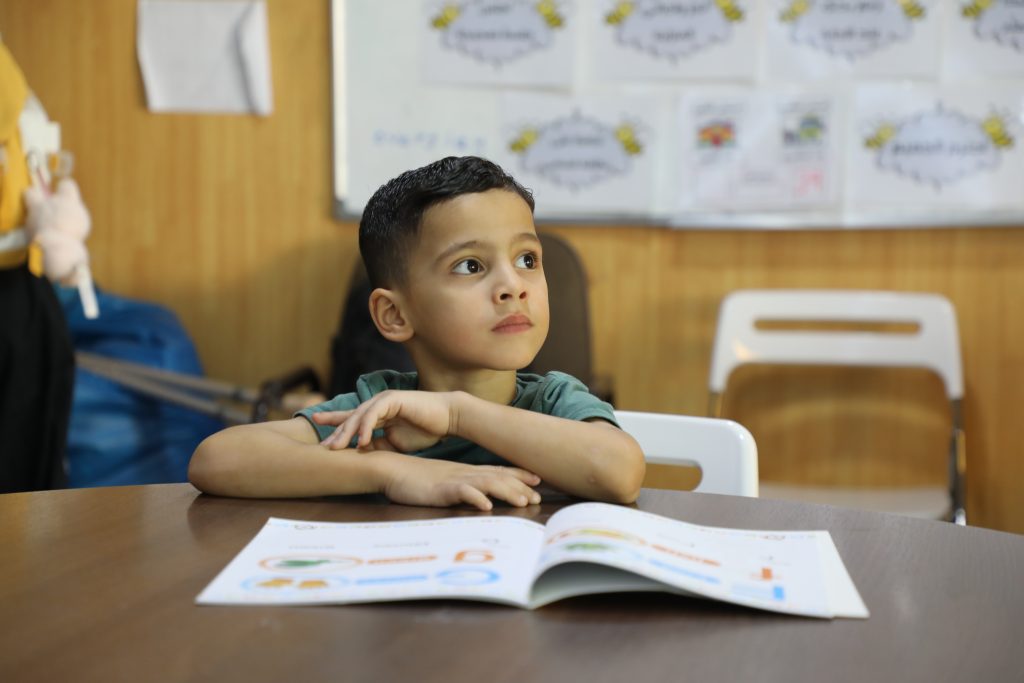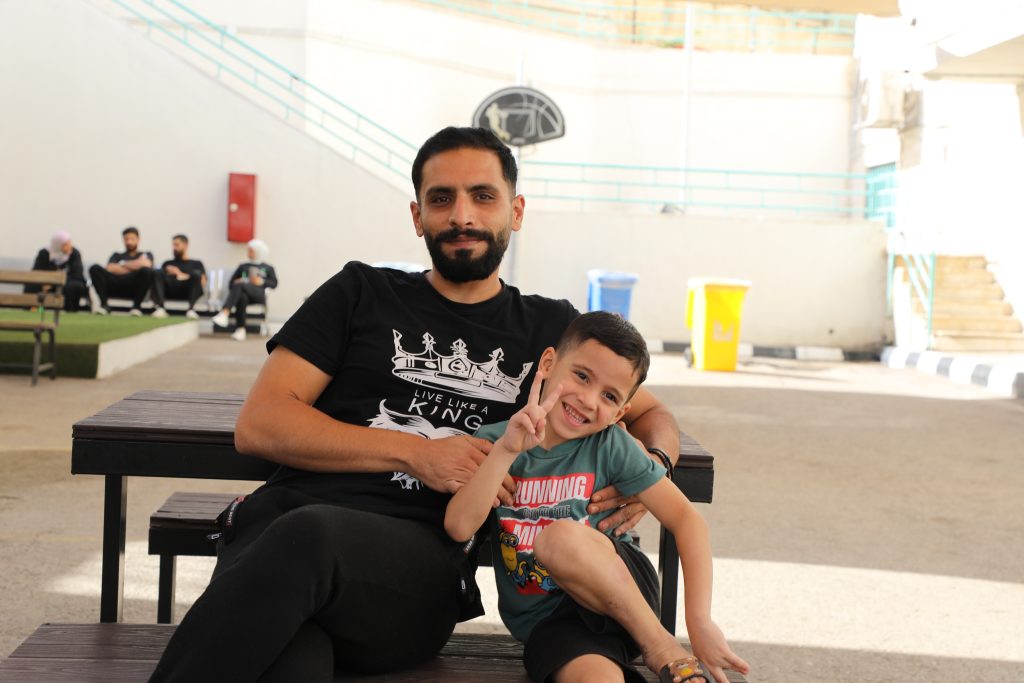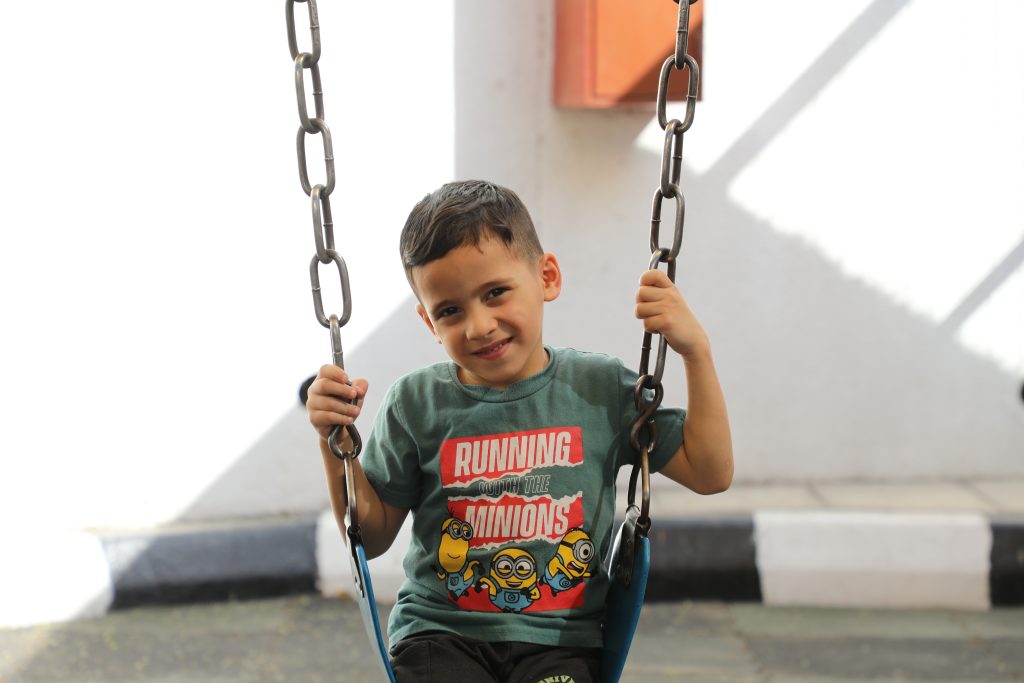Over the past two years, Israel’s genocidal campaign in Gaza has caused unimaginable loss and devastation. People in Gaza, including our colleagues, have been killed, injured, starved, besieged and displaced.
Our colleague Mohammad Al Hawajri, who worked in Gaza as an operating theatre nurse, recounts how he and his family tried to find safety that never came and how he eventually managed to escape with Omar, his five-year-old son. Omar was injured by an Israeli airstrike and is now receiving treatment at MSF’s reconstructive surgery hospital in Amman, Jordan.
“Days after the war broke out in Gaza, Israel ordered about half of the entire population to flee to the south. We stayed in the north and moved to the nearest MSF office where many of the staff and their families gathered. It felt safer than our homes, though every sound outside reminded us that nowhere was truly safe.
As weeks passed, Israeli forces stormed Al-Shifa Hospital, and fear spread through every corner of Gaza City. By then, shops and bakeries had long shut down, and hunger was starting to tighten its grip on the north of the Strip. The city was being demolished and the people who remained starved. We decided to flee, hoping the south might offer a small chance of survival.
MSF tried to arrange safe passage for the staff during brief windows permitted by Israeli Forces. We set off in a convoy of cars carrying both MSF staff and their families. But with thousands desperate to flee and chaos overwhelming the Netzarim corridor, the window closed before we could cross to the south and we were forced to turn back to Gaza City. As our convoy, which was clearly marked with MSF logos, turned back toward the clinic, gunfire suddenly erupted. Bullets tore through the air; windows shattered, and shrapnel ripped into our vehicles.”

“In the chaos of the gunfire, Alaa Al-Shawa, who had been volunteering with MSF as an emergency nurse, was shot in the head while holding my children. He died instantly.
My children remember that day as if it were yesterday – the gunfire coming from so many directions that it was impossible to tell where it began, the bullet that passed just above their heads before striking Alaa, and the killing of our colleague and friend whom they loved deeply. We were close enough to the clinic to rush inside, but even there, we watched Alaa bleed as every attempt to save him failed.
The children were screaming, their cries filling the air as Alaa was buried. We stood there in disbelief; our minds unable to process what had happened.
We remained trapped in the clinic for the next few days, sleeping in the same place where Alaa’s body lay beneath the ground. There was nowhere else to go. My eldest son was especially shaken; each night he woke up crying, haunted by the image of Alaa’s dead body and what he had seen.
When we finally managed to cross to the south in late November 2023. The road ahead was filled with corpses lying where they had fallen. It was a sight no one could ever erase from their minds.”

“Finally, we reached Khan Younis and found shelter in the MSF premises. But even there, the war found us. A nearby strike shattered the windows, shaking the building to its core. Later, a tank shell hit the facility directly, despite it being clearly marked with the MSF flag and logo. In that attack, the daughter of one of our MSF colleagues was killed.
After the bombing, we fled again, this time to Rafah, the so-called safe zone. But even there, the airstrikes never stopped. If the bombs did not fall directly on homes, their shrapnel would still tear through walls and shelters.
Months of displacement followed, marked by unbearable loss and inhumane living conditions. Time blurred as we moved from one place to another, surviving day by day. Just when we thought we had endured the worst, the genocide brought new terror to our doorstep. On 27 June 2025, an airstrike struck the street beside our home. Our youngest son, Omar, was standing by the door when a piece of shrapnel tore through his leg. He was only five, already weakened by months of fear and hunger.
In Gaza, he underwent several surgeries in unbearable conditions, amid starvation and soaring prices of food and medicine that we could no longer afford or access under the Israeli siege.
Six weeks later, our colleagues managed to transfer us to the MSF reconstructive surgery hospital in Jordan. By then, Omar was malnourished, and his siblings were dangerously underweight.
Here in Amman, he has undergone additional surgeries and received mental health care. He can now stand, play, and just be a child again. Watching him take those first steps toward recovery reminds us that even after everything, life can begin again.”

“But no matter how much care he receives, a part of his childhood will always carry the scars of what happened – a genocide that we still struggle to believe was allowed to happen to us, to our children, and to the land we love so deeply.”
Since 7 October 2023, MSF’s Reconstructive Surgery Programme (RSP) in Jordan has received 45 children* along with their caretakers from Gaza for specialized reconstructive surgery and rehabilitative care.
The RSP in Amman was originally established in 2006 to treat victims of the Iraq War. As conflict-related injuries surged across the Middle East, the hospital in Amman expanded to admit patients from more than six countries, offering medical expertise unavailable in their home countries. The RSP has grown into a regional hub for the treatment of patients with complicated, life-changing injuries, offering surgical and rehabilitative care for orthopedic, plastic and maxillofacial trauma, burns and other conflict-related injuries. Its holistic approach includes surgical care, physiotherapy, occupational therapy, mental health support, and psychosocial care. Most patients stay for months at a time to heal their physical and psychological wounds.
*As of 26 October
-
Related:
- medevac
- medical evacuation
- Refugee












